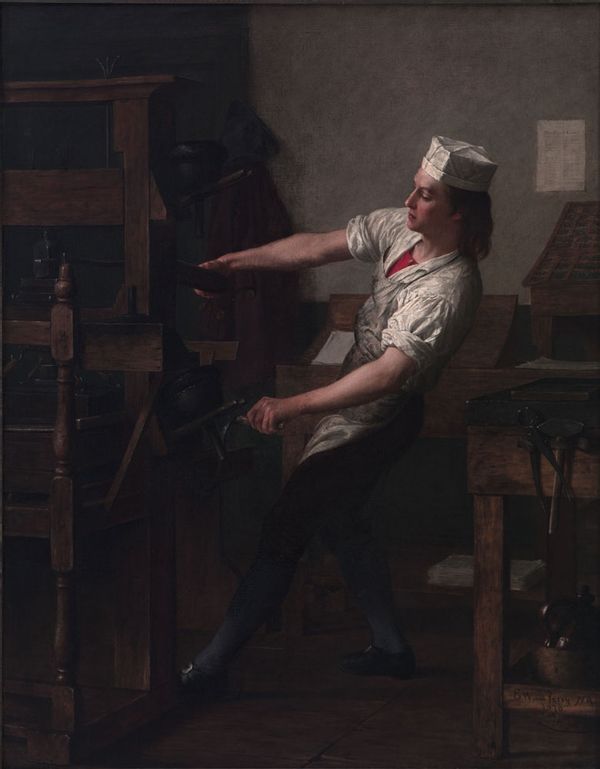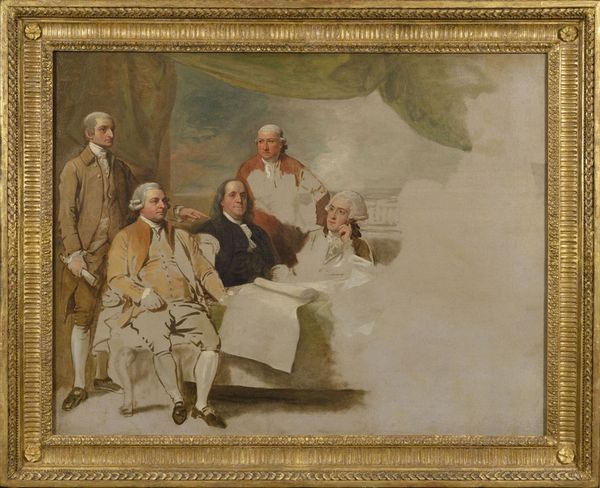Ken Burns on Benjamin Franklin & our nation’s flawed identity: “Race is the central question” of US
“Guests, like fish, begin to smell after three days.”
Benjamin Franklin‘s oft-paraphrased quote, which pops up in the second season of Neflix’s drama “Virgin River,” is employed by a small-town mayor who begrudgingly takes in someone she dislikes. It’s a favorite quote of reluctant hosts, for obvious reasons but also a testament to the enduring wit of Franklin more than 250 years later.
The Founding Father is the subject of Ken Burns’ latest docuseries on PBS, airing across two nights. The first part lays the groundwork for Franklin’s apparent brilliance and innovation when it comes to publishing and science. His “Poor Richard’s Almanack” was a sensation because he added humor (e.g. comparing visitors to fish), helpful advice and other fun bonus content to the usual dry weather reports seen in almanacs of the day. It’s especially impressive considering he was mainly self-taught, having had his formal education cut short at age 10.
RELATED: Why France really helped America’s Founding Fathers fight the Revolutionary War
“Apprenticing himself to a printer and becoming a printer means you’re setting words upside-down in type, which means that you get a kind of hyper-literacy which he displays all the time,” Burns said during the Television Crisis Association press conference for the series in January, along with many talking heads from the project.
Franklin the intellectual pioneer
Biographer Walter Isaacson also gives Franklin credit for pioneering a type of irreverence that wasn’t seen in the stuffy statesmen or religious leaders of the day. This explains why his writing struck a chord with the common man.
“I think he invents a classic form of American writing,” said Isaacson at the press conference. “He does not speak in the Original Sin [manner of theologian] Jonathan Edwards. Instead, it is a casual, ‘cracker barrel’-type humor in which he’s talking in an informal way – whether it is ‘Poor Richard’s Almanack’ or any of the parodies and hoaxes that he writes for his newspaper or the autobiography.
“So that form of humor leads you to Mark Twain and Will Rogers and so many others, and it
“He’s the first to develop that ‘aw shucks,’ cracker barrel, informal way of writing”
pokes fun at the pretensions of the elite. And he’s the first to develop that. He gets it a little bit from Addison and Steele, the British editors of The Spectator, but in some ways he’s the first to develop that ‘aw shucks,’ cracker barrel, informal way of writing.”
 “Young Franklin at the Press” by Enoch Wood Perry, 1876. (In the collection of Albright-Knox Art Gallery, Buffalo, New York)He wasn’t just handy with words though. Most school children first encounter Ben Franklin as the man who flew a kite and “discovered” electricity – or more accurately, created the lightning hypothesis and proved it. His curiosity and creativity knew no bounds, and he’s rightfully revered as one of America’s true Renaissance men, who was as familiar with wielding words as he was with the application of Newtonian physics.
“Young Franklin at the Press” by Enoch Wood Perry, 1876. (In the collection of Albright-Knox Art Gallery, Buffalo, New York)He wasn’t just handy with words though. Most school children first encounter Ben Franklin as the man who flew a kite and “discovered” electricity – or more accurately, created the lightning hypothesis and proved it. His curiosity and creativity knew no bounds, and he’s rightfully revered as one of America’s true Renaissance men, who was as familiar with wielding words as he was with the application of Newtonian physics.
“I think the importance of Ben Franklin is that he was able to connect art and science, able to connect the humanities and the technology,” added Isaacson. “He cared about everything you could possibly learn about anything, from art to anatomy to math to music to diplomacy.
“And his science helped inform the things that he did. By being an expert in Newton, he understood checks and balances, and balances of power. His electricity experiments are the most important scientific achievements of that period, right after Newton. And, so, I do think by being like a Renaissance man, like a Leonardo da Vinci, he’s able to see the patterns in nature. And he thought of himself as a scientist and an inventor. I think that is ingrained not only in him, but into what the foundation of America was about.”
RELATED: Colonial America was divided over smallpox innoculation, but Benjamin Franklin championed science
Among his inventions, which he refused to patent, are the lightning rod, bifocals, the Franklin stove and even the eerie-sounding armonica – a musical instrument that used an array of glass bowls.
Franklin the flawed statesman
Burns’ docuseries is no hagiography, however. Despite Franklin’s brilliance, he was a flawed man who was often the first to admit it. At age 20, he created a list of 13 virtues – among them temperance, justice, chastity and humility – by which he tried to develop his character. But even by his own standards he often failed, such as when he had a child out of wedlock. To this day, Franklin is known to have been quite the womanizer.
“He liked to party. He liked women.”
“He’s a total rascal, too,” Rutgers University history professor Dr. Erica Armstrong Dunbar told the press. “He’s someone who the common man can connect to, right? He liked to party. He liked women. These are the things Ken made certain to balance in this film, that while we see him and his immense knowledge, we also see him as a person.”
Want a daily wrap-up of all the news and commentary Salon has to offer? Subscribe to our morning newsletter, Crash Course.
While certain failings may seem forgivable in a man who contributed so much to our country, his track record with slavery cannot be ignored in a person who is integral to how American defined itself and its ideals. Not only did Franklin own several enslaved people, but he also enabled slavery through his publications and the use of his general store. Only much later in life, when the country was being founded, did he become an abolitionist.
Having covered so many American figures, events and institutions throughout his body of work, Burns has had to contend with addressing the nation’s racism repeatedly – whether in “The Civil War,” “Jazz” or “Jackie Robinson.” Racism is as American as apple pie, or in this case, a Founding Father.
“Race . . . is the central question of the United States”
“Race . . . is the central question of the United States,” said Burns. “It comes from the Three-fifths [Compromise]. It comes from the fact of the Declaration written by a guy who said, ‘We hold these truths to be self-evident, that all men are created equal,’ and he owned hundreds of human beings in his lifetime and didn’t see the hypocrisy and the contradiction. This is us.”
 American Commissioners of the Preliminary Peace Negotiations with Great Britain: John Jay, John Adams, Benjamin Franklin, Henry Laurens and William Temple Franklin (Courtesy of Benjamin West, in the collection of Winterthur Museum, Garden & Library)Despite some defenders of 1787’s Three-fifths Compromise – which counted enslaved people as three-fifths of a person for the purposes of distributing income tax funds back to states and determining congressional representation – Isaacson calls it “odious . . . Whether it was done to help the South get representation or hurt the South, it was dehumanizing.”
American Commissioners of the Preliminary Peace Negotiations with Great Britain: John Jay, John Adams, Benjamin Franklin, Henry Laurens and William Temple Franklin (Courtesy of Benjamin West, in the collection of Winterthur Museum, Garden & Library)Despite some defenders of 1787’s Three-fifths Compromise – which counted enslaved people as three-fifths of a person for the purposes of distributing income tax funds back to states and determining congressional representation – Isaacson calls it “odious . . . Whether it was done to help the South get representation or hurt the South, it was dehumanizing.”
Armstrong Dunbar added, “That’s the age-old issue, question, vestige, whether or not we’re talking about three-fifths of a human being being represented or the call about Black life mattering. We can draw those connections. And I’d argue that while that was for the sake of compromise, that there were long-lasting, long-reaching effects that were attached to that specific decision . . . We all know what the collateral damage was here.”
“It’s horrifying. It is beyond original sin.”
“It’s horrifying. It is beyond original sin. It is unforgivable,” said actor Mandy Patinkin, who voices Franklin in the series. “And to think that if Franklin hadn’t realized the necessity of compromise, we would not have had a Constitution. So, he tried to weigh all of that and then chose to devote the rest of his life to righting his own wrong, which was first to be a slave owner and then to devote the rest of his life to be an abolitionist.”
Capturing that context of why Franklin may have had to act against his own beliefs is part of Burns’ challenge as a documentarian. Even the idea of American independence isn’t necessarily the pure and noble desire for autonomy that it’s usually depicted to be.
“I think it’s particularly true in this film, understanding all of the competing motives of independence,” he said. “It’s all right to throw out the dream of a democracy, but there’s lots of land speculation in the Ohio Valley that’s animating a lot to become patriots and not to stay loyalists. If you think there’s money going to be made, then maybe that’s a decision that people make and Americans certainly make.
“So, it is a very, very complicated and ever-shifting thing. We tend to see the past as fixed, but it is not, it is malleable,” he continued. “And our job as historians is to actually embrace that malleability, not just as new information, new artifacts arrive, but as new ways of thinking, new modes of inquiry compel us to different ways of expression.”
The four-hour “Benjamin Franklin” airs over Monday and Tuesday, April 4-5 at 8 p.m. on PBS. Watch a trailer for it below, via YouTube.
More stories to read:

